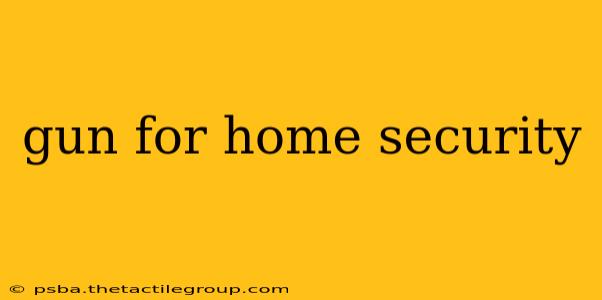Protecting your home and family is paramount, and for many, that includes considering firearms for self-defense. This guide offers a comprehensive overview of choosing the right gun for home security, emphasizing safety, responsible gun ownership, and legal considerations. This is not an endorsement of firearm ownership, but rather an informational resource for those who have already made the decision to pursue this option. Always prioritize local and federal laws and regulations.
Understanding Your Needs and Limitations
Before diving into specific firearm types, honestly assess your needs and limitations:
1. Experience Level:
- Beginner: If you're new to firearms, simpler designs like a pump-action shotgun or a revolver are generally recommended. These platforms are less complex to operate under stress. Extensive training is crucial.
- Experienced: Experienced shooters might consider more advanced options like semi-automatic pistols or rifles, offering higher capacity and faster follow-up shots. However, the added complexity requires rigorous practice and proficiency.
2. Physical Capabilities:
- Strength and dexterity: Consider the weight and recoil of the firearm. Heavier weapons can be difficult to handle, especially for extended periods or in stressful situations. Recoil can be significant, impacting accuracy and control.
- Hand size: Ensure a comfortable grip and proper reach to the trigger. Incorrect fit can compromise safety and accuracy.
3. Living Situation:
- Space: The size of your home and storage options will influence the size and type of firearm. Larger firearms may require more substantial storage.
- Noise levels: Consider the potential for noise disturbance to neighbors, especially with higher-caliber firearms.
Types of Firearms Commonly Used for Home Defense
Several firearm types are commonly used for home security. Each has advantages and disadvantages:
1. Shotguns:
- Advantages: Powerful stopping power, relatively simple operation, effective in close quarters. A wide variety of ammunition is available, from less-lethal options to high-powered rounds.
- Disadvantages: Can be heavy and cumbersome, significant recoil, limited accuracy at longer ranges. The spread of shot can cause collateral damage.
2. Handguns:
- Advantages: Easy to store and conceal, relatively lightweight and easy to maneuver.
- Disadvantages: Lower capacity than rifles or shotguns, require more precise aiming, can be less effective than longer-barreled weapons.
3. Rifles:
- Advantages: Higher accuracy and range compared to shotguns and handguns, various ammunition types available.
- Disadvantages: Can be difficult to maneuver in close quarters, require more storage space. Over-penetration is a significant concern.
Ammunition Considerations
Ammunition selection is just as critical as the firearm itself. Factors to consider include:
- Caliber: Different calibers offer varying levels of stopping power and recoil. Research extensively to understand the ballistics of different calibers.
- Type: Consider the type of ammunition, such as full metal jacket (FMJ), hollow point (HP), or frangible rounds. Each offers different characteristics regarding penetration and expansion. Consult with a firearms expert to determine the best option for your specific needs and home environment.
Safety and Training
This cannot be overstated: Safe gun handling is paramount. Never handle a firearm without proper training. Consider taking a comprehensive firearms safety course from a certified instructor. This includes:
- Safe storage: Securely store your firearm and ammunition separately, out of reach of children and unauthorized individuals.
- Proper handling: Learn and practice safe handling techniques, including how to load, unload, and clear malfunctions.
- Target practice: Regular target practice is essential to maintain proficiency and accuracy.
Legal Considerations
Firearm ownership and use are subject to numerous federal, state, and local laws. Thoroughly research and understand all applicable regulations in your area before purchasing or possessing a firearm. This includes:
- Licensing requirements: Determine if you need a license to purchase or own a firearm.
- Registration: Understand any registration requirements for firearms in your jurisdiction.
- Storage laws: Familiarize yourself with laws concerning the safe storage of firearms.
Conclusion
Choosing the right gun for home security requires careful consideration of your individual needs, capabilities, and the legal landscape. Prioritize safety, training, and responsible gun ownership above all else. This information is for educational purposes only and should not be considered legal or professional advice. Consult with law enforcement, firearms experts, and legal professionals to make informed decisions.

